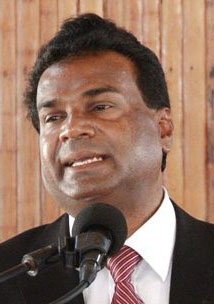Head of the National Secretariat of the Guyana Extractive Industries Transparency Initiative (GY-EITI), Rudy Jadoopat, says that he hopes the recently published EITI report for 2017 will be used to facilitate public debates and discussions about the state of the industry.
Speaking to Stabroek News on Saturday, Jadoopat explained that they were able to publish their report according to the timeline that was set by the international body, which is 18 months after becoming an EITI implementing country.
“We could not have missed that deadline. The Multi-Stakeholder Group (MSG), which is the decision making body for the GY-EITI, on the April 25, approved the report after reviewing the draft,” Jadoopat said, while pointing out that the report was published on their site on Thursday.
He said that now that the report has been published and made available for public scrutiny, he is hoping and looking forward to when the public will “take the report and engage in public debates among themselves and all over the country.
“Now it is time for the media to take the report, break it up, move it forward and take it to the next level to be engaged in discussions. What people think is right, what they think is wrong—they have to share their opinion and advertise it and there are lots of things to talk about in [the] report. The population needs to know what is going on in their extractive sector,” he explained.
Jadoopat recalled that before the report was produced, there were five phases of work that took place, which included the production of a scoping study and an inception report. After that, they would’ve received the reporting templates that were proposed by the Independent Administrator (IA) BDO LLP, which was then approved by the MSG, along with the scoping study and inception report.
The fourth phase featured the completion of the template on the determination of the materiality threshold by the reporting agencies that were identified by the MSG, six of those being government agencies, namely the Guyana Gold Board (GGB), the Guyana Geology and Mines Commission (GGMC), the National Insurance Scheme (NIS), the Ministry of Finance, the Environmental Protection Agency (EPA) and the Guyana Revenue Authority (GRA).
During the data collection phase, Jadoopat had pointed out at a workshop that they were having difficulty getting information from the government agencies, but explained on Saturday that after reports were carried by Stabroek News, “Things started to change and all the government agencies cooperated fully.”
“We were able to get most of the information for the templates. There was a list of documents that was requested from six agencies and that was about 90 at first but came down to about 80, but generally we got more than 70% of the information requested,” Jadoopat said, while noting that the information gathered was enough to show the government’s commitment to implementing the initiative in Guyana “has been real”.
After collecting the information, a draft report was made and sent to the Secretariat, which was then channeled down to the MSG for discussion and possible modification.
“We had a meeting with the IA and MSG on the draft and they made a lot of comments, suggestions and recommendations for the improvement of the report, which was fantastic and shows that the MSG is fully cooperating, participating and making decisions on the matter as is required by the standard,” he added.
Jadoopat emphasised that it was the MSG— which comprises of representatives from the government, industry and civil society— that moved the process forward and was “the guiding force” that deserves all the praise.
“At the last minute, because of the time factor, there was some hesitation in approving the scoping study and the inception report, the draft template and also the materiality threshold and the number of reporting entities. There was some delay in the process but finally that came on board and we started to move the process in order to be complete by the deadline,” he pointed out.
He said that the next step is to deal with the outcomes and impact and that the EITI report would be of no value if it is not being used to increase the public’s awareness.
“We are going to be engaging the public, companies and civil society on the outcome of the first report and to try to implement the recommendations as much as possible and as much as the legal and regulatory frameworks permit,” he said.
In accordance with the EITI standard, Guyana must now produce its second report for the financial year of 2018 by the end of December 2020, however, Jadoopat noted that the MSG has stated their willingness to have the report completed before so that the country can be validated sooner.
“We are going to prepare for validation now. If we do not have any other reports out, our validation will be based on the first report, which has some weaknesses. It’s the first time we are doing it so there are flaws – which were not substantial enough to not publish the report. Our second report will definitely be better than the first,” he added.






